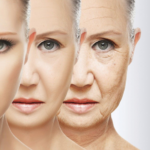As we age, our bodies’ natural collagen production begins to decline, leading to noticeable signs of aging such as sagging skin, wrinkles, weak hair, and joint pain. Hence, collagen supplementation through diet or supplements has become a popular solution. However, certain daily habits can hinder the effectiveness of collagen supplementation, rendering all skin and health care efforts futile.
1. Fried Foods
While fried foods are always a tempting choice, they are the enemy of collagen. They contain high levels of advanced glycation end products (AGEs), free radicals, and trans fats. These substances damage the body’s collagen structure, causing skin to lose its elasticity and glow. Particularly, free radicals not only break down collagen but also accelerate the aging process, undermining the effectiveness of collagen supplementation from food or functional products.

Fried foods are always a tempting choice, but they are the enemy of collagen.
2. Sugary Treats
Foods high in sugar also negatively impact the effectiveness of collagen supplementation. Sugar in the body promotes the process of glycation, producing AGEs, reducing skin elasticity, increasing the risk of chronic inflammation, and causing wrinkles. Overconsumption of sugar can negate the effects of collagen. To improve, prioritize low-glycemic foods such as cherry tomatoes, guava, vegetables, whole grains, and lean protein. These foods not only enhance beauty but also support comprehensive health.
3. Oxalate-Rich Foods
Oxalate is a natural compound found in foods like leafy greens, chocolate, beets, and soy. However, excessive consumption of oxalate-rich foods can hinder the body’s absorption of essential minerals like calcium and magnesium, which are necessary for collagen synthesis. Therefore, when supplementing with collagen, avoid consuming oxalate-rich foods simultaneously or immediately after. This optimizes collagen absorption and effectiveness in the body.
4. Carbonated Drinks
Sugary sodas not only contain high amounts of sugar but also diminish the body’s collagen effectiveness. When combined with collagen, the sugar in carbonated drinks forms the end products of the sugarization reaction, reducing elasticity and promoting collagen breakdown. Additionally, phosphoric acid in sodas inhibits calcium absorption, impacting collagen production. To protect skin health, avoid sugary sodas, especially during or immediately after collagen supplementation.

Sugary sodas diminish the body’s collagen effectiveness.
5. Caffeine
Coffee is a familiar beverage, but excessive caffeine intake prompts the body to produce cortisol, the stress hormone. Elevated cortisol levels not only affect overall health but also hinder the absorption of essential nutrients, thereby inhibiting collagen production. While moderate coffee consumption is not harmful, limiting caffeine intake is advisable when aiming to supplement collagen for beauty and skin health.
6. Alcohol
Alcohol is a significant hindrance to the effectiveness of collagen supplementation. Excessive alcohol consumption overworks the liver, weakening its detoxification function and increasing free radicals in the body. These free radicals break down collagen and accelerate aging. Moreover, alcohol causes dehydration, a crucial factor in collagen synthesis. Thus, for effective collagen supplementation, it is best to minimize the consumption of alcoholic beverages.
To maximize collagen’s benefits, maintain a healthy diet, avoid harmful foods and habits that impair collagen production. Stay hydrated, and consume a diet rich in protein, vitamin C, and minerals like zinc and copper to improve skin quality and overall health. Additionally, steering clear of collagen-damaging factors such as fried foods, sugary treats, and alcohol will enhance collagen absorption, resulting in youthful and firm skin.


































